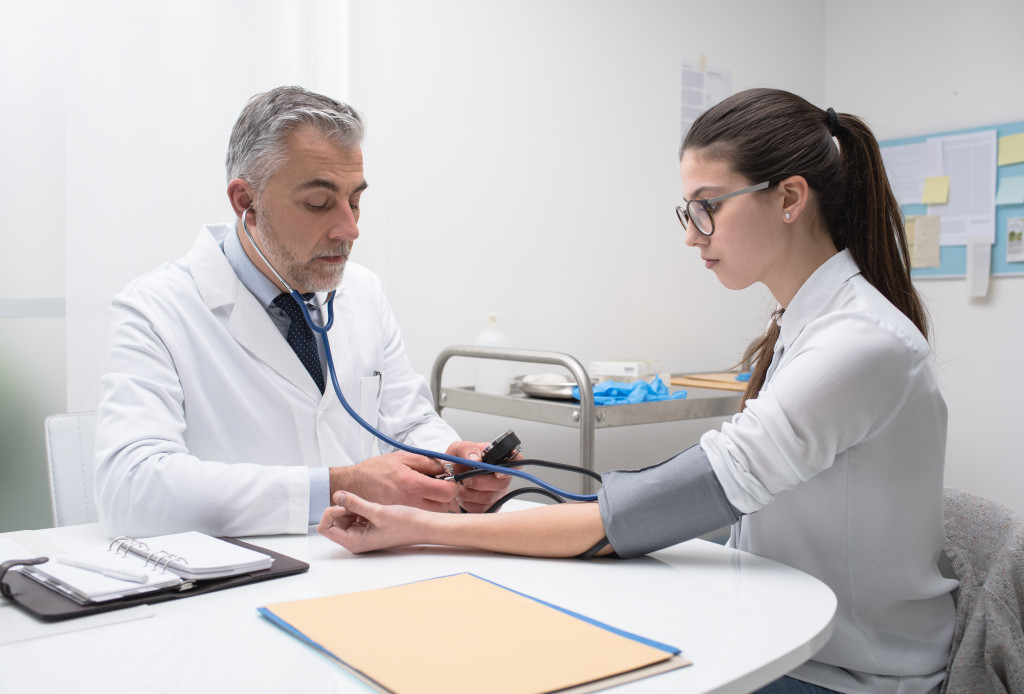- Regular medical check-ups are crucial to protecting your physical health and preventing potential illnesses.
- General health check-ups involve measuring blood pressure, weight, height, and temperature and examining vital organs.
- Blood pressure and cholesterol screening help to detect possible heart complications, while BMI assessment identifies the risk of obesity-related diseases.
- Vision and hearing tests enable healthcare professionals to identify sensory problems, while dental check-ups detect oral health issues early.
- Age-specific check-ups can screen for breast or cervical cancer in women and prostate cancer in men.
Ensuring you’re physically healthy is essential in today’s busy world. With the ever-growing stress levels and unhealthy lifestyle choices, regular medical check-ups are the first step towards maintaining good health. Preventive healthcare is not just a matter of getting fit—it’s a means to protect yourself against possible health concerns or illnesses in the future.
Doctors often suggest that regular medical check-ups are vital to keeping track of an individual’s physical health, as everyone’s body is unique and reacts differently to the environment.
For instance, age, genetics, medical history, and lab results can all play a critical role in determining the healthcare requirements of an individual. It’s always advisable to consult with a medical professional and prioritize a preventive healthcare approach, which can be more cost-effective and time-saving in the future.
To keep up with your winning streak of good health, here are some essential check-ups you shouldn’t skip.
General Health Check-Ups
General health check-ups include a physical examination measuring blood pressure, weight, height, and temperature. It also involves examining your vital organs such as eyes, nose, ears, throat, breathing, and heartbeat.
Annual Physical Examination
The annual physical examination enables healthcare professionals to understand an individual’s physical and mental health.
This includes understanding the past medical record and conducting a thorough physical examination. The doctor may also take blood for a series of tests like a Complete Blood Count (CBC), which examines several components in your blood, or an HBA1C test to screen for diabetes.
Blood Pressure and Cholesterol Screening
Monitoring blood pressure and cholesterol levels are vital health check-ups that help to prevent heart attacks and strokes. High blood pressure can increase the risk of other life-threatening illnesses.
Body Mass Index (BMI) Assessment
BMI, or body mass index, measures body fat based on an individual’s height and weight. It can be an essential check-up to identify if an individual is overweight or obese. By checking BMI, you can reduce the risk of developing various obesity-related illnesses such as diabetes, heart disease, or stroke.

Specific Health Screenings
As the saying goes, “Prevention is better than cure.” This adage rings true, especially when it comes to health. Regular health screenings and check-ups allow you to prevent potential health problems, catch diseases early, and manage existing health conditions.
Vision and Hearing Tests
Regular vision and hearing tests are essential to maintain your sensory health. Vision and hearing problems can affect your daily life and lead to accidents or injuries.
Many eye diseases, such as glaucoma, don’t show early symptoms, so regular screenings are essential to prevent vision loss or blindness. Hearing tests can detect hearing loss early, which can often be improved with hearing aids.
Dental Check-up and Oral Health Assessment
Oral health is closely linked to overall health. Regular dental check-ups can help detect oral health problems early, which can be treated before they become severe. A dental check-up includes a dental exam, cleaning, X-rays, and oral cancer screening.
Visiting a trusted dental clinic can also provide you with dental education, tips, and advice on how to care for your oral health at home.
Skin Cancer Screening
Skin cancer is the most common cancer in the United States. Regular skin cancer screening can detect abnormal skin growths early, which can be remedied before they develop into skin cancer.
Skin cancer screenings often include a head-to-toe skin exam by a dermatologist, checking for moles or any irregular skin growths.
Age-Specific Check-Ups
Age-specific check-ups help to determine specific health issues that may be a concern depending on an individual’s age and sex. Some standard age-specific check-ups are listed below.
Mammograms
Mammograms are typically screening tests for women aged 40 and above, which are carried out to detect breast cancer.
Timely detection of breast cancer through regular mammograms can save lives and expedite the treatment process.
Pap Smears
Pap smears or Pap tests are commonly recommended for women between the ages of 21-65 to check for cervical cancer. Timely detection can help prevent the development or progression of cervical cancer.
Prostate Exams
Prostate cancer is one of the leading causes of death among men globally. Men aged 40 and above are encouraged to get annual prostate exams to detect any potential health concerns with the prostate gland.
Bone Density Scans for Seniors
Aging can lead to fragile bones or osteoporosis. Therefore, seniors must keep an eye on their bone health. Bone density scans are recommended for individuals aged 65 or above. The scans can reveal if the bones have lost calcium and become porous or brittle.

Prioritizing regular health check-ups is the first step toward living a healthy life. These check-ups are designed to address any health concerns and ensure that you lessen the risk of developing potentially life-threatening illnesses and diseases.
By monitoring your health and seeking professional medical advice, you can skew the odds of being diagnosed with a severe illness in your favor.






